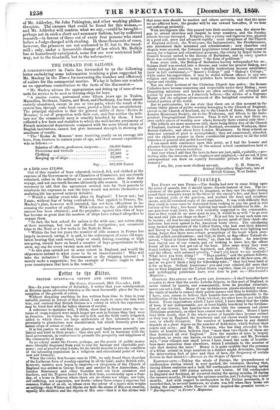ttranings.
THE Ftonr ON THE PE1110.—The flotilla had now to cease firing upon the point of assault, lest it should injure friends instead of foes. 1 he ex- citement of the gun-crews may be imagined, as they saw the night closing round their comrades wrapt in the blaze of the enemy's fire, and they heard the exultant yells of the garrison, and marked the faint and desultory cheers, and ill-sustained reply of the assailants. It was with difficulty that they could in some cases be restrained from rushing to join the good or evil fortune of the fray ; five hours' fighting had made all indifferent to life. As one gun-boat went down, the crew modestly suggested to the commander, that as they could do no more good in her, it would be as well "to go over the mud and join our chaps on shore !" It is not fair to say such men can be beaten ; all had become imbued with the heroic spirit of their chief—the infection had even spread to the American boats' crews. The calculating long-backed diplomatists of the United States, who had sent their Admiral and Envoy to reap the advantages for which Englishmen were fighting and dying, forgot that there were certain promptings of the heart which over- ride all selfish considerations ; and that, in short, as flag-officer Tatnall ob- served,. "blood is thicker than water," ay, than ink either. An American boat visited one of our vessels, and on wishing to leave her, the officer found all his men had got out of the boat. After some delay they were found looking very hot, smoke begrimed, and fightish. "Halloo, sirs," said the officer, with assumed seventy, "don't you know we are neutrals ? What have you been doing ? " "Begs pardon," said the gallant fellows, looking very bashful ; "they were very short-handed at the bow-gun sir, and so we give'd them a help for fellowship sake ; " they had been hard at it for an hour. Gallant Americana! you and, your admiral did more that day to bind England and the United States together, than, all your lawyers and pettifogging politicians have, ever done to part us.—Blackicood's Ifagazine..
COMPLEX RBI...moss or PLANTs AND AXLMALS.—I shall hereafter have occasion to show that the exotic Lobelia fulgens, in this part of England, is never visited by insects, and consequently, from its peculiar structure, never can set a seed. Many of our orehidaceous plants absolutely require the visits of moths to remove their pollen-masses and thus to fertilize them. I have, also, reason to believe that humble-bees are indispensable to the fertilization of the heartsease .(Viola tricolor), for other bees do not visit this flower. From experintents which I have tried, I have found that the visits of bees, if not indispensable, are at least highly beneficial to the fertiliza- tion of our clovers; but humble-bees alone visit the common red clover (Trifolium protease), as other bees cannot reach the nectar. Hence I have very little doubt, that if the whole genus of humble-bees became extinct or very rare in England, the heartsease and red clover would become very rare, or wholly disappear. The number of humble-bees in any district depends in a great degree on the number of field-mice, which destroy their combs and nests ; and Mr. H. Newman, who has long attended to the habits of humble-bees, believes that "more than two-thirds of them are thus destroyed all over England." Now the number of mice is largely dependent, as every one knows' on the number of cats ; and Mr. Newman says, "near villages and small towns I have found the nests of humble- bees more numerous than elsewhere, which I attribute to the number of cats that destroy the mice." Hence it is quite credible that the presence of a feline animal in large numbers in a district might determine, through the intervention first of mice and then of bees, the frequency of certain flowers in that district T.—Darwin on the Origin of Species.
EARTHWAK19.—Taking the whole of Europe, the preponderance of earthquakes during winter is very marked, the catalogue showing that, during fifteen centuries and a half, 857 earthquakes occurred during spring and summer, and 1165 during autumn and winter. Of 2.55 earthquakes in Ragland and Scotland, 44 occurred during the spring months, 58 during the summer months, 79 during the autumn months, and 74 during the winter months. And with respect to earthquakes in the Italian peninsula, it is recorded that, in several instances, no alarm was felt when they broke out during the summer' while those in winter inspired the greatest terror.— " Earthquakes," inFroser's itagazine.


























 Previous page
Previous page